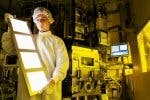Fraunhofer opens Center for Organic Materials and Electronic Devices in Dresden
The Federal Government of Germany, the Free State of Saxony and the European Union have invested a total of 25 million Euro in the Center for Organic Materials and Electronic Devices Dresden (COMEDD).
The primary purpose of the center is to develop economically viable and production-oriented processes for organic semiconductor devices such as OLEDs and organic solar cells, and to secure a manufacturing industry in Europe.
In order for OLEDs to assert themselves on the mass market however, they must be manufactured at viable costs.
“An industry for organic illumination will only be created when we in Europe not only provide development and design, but if we also manufacture,” explains Prof. Karl Leo, Director of Fraunhofer IPMS. “And only the most modern facilities will allow us to attain the necessary level of research and development. With COMEDD, we are expanding our leading position as a cluster for Organics in Europe.”
Thierry Van der Pyl, Director in the European Commission, expresses similar view, “In the past we have often had to watch as technology of European origin was transferred to foreign countries for volume production. COMEDD is meant to ensure that both development and production know-how stays in Europe, and that jobs will be secured.”
Premier Tillich commented: “Six weeks ago I was five kilometers away from here at the British company 'Plastic Logic' for the dedication of a new production facility for the mass production of plastic electronics. The start of COMEDD today is further proof of the dynamic development of the Dresden region as a leading site for the R&D of semiconducting organic materials.”
COMEDD in detail
The core of the Center is made up of numerous facilities for vacuum coating. For the manufacturing of OLEDs on glass substrates, an innovative coating line for glass and film from Sunic System (South Korea) will be installed at COMEDD in co-operation with Aixtron AG (Germany). This line, with a capacity of up to 13,000 m2 per annum, will enable the production-oriented evaluation of new process concepts with subsequent pilot production.
COMEDD is part of the largest R&D cluster for organic semiconductors in Europe. Over 15 companies and institutes with more than 500 employees work in this fast-growing field in the Dresden region.
The Fraunhofer Institute for Photonic Microsystems (IPMS) works together with about 250 employees on electronic, mechanical and optical components and their integration into the tiniest “intelligent” devices and systems. The product pallet is geared toward customers who want to expand the functionality of their products with the implementation of OLEDs and microsystems (MEMS, MOEMS, CMOS), which offer innovative system characteristics and ever-shrinking dimensions.









